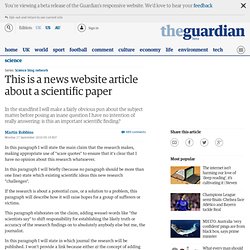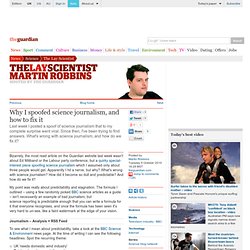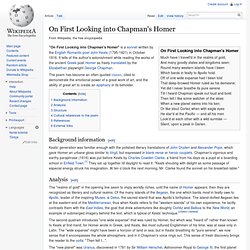

This is a news website article about a scientific finding. In this paragraph I will state the main claim that the research makes, making appropriate use of "scare quotes" to ensure that it's clear that I have no opinion about this research whatsoever.

In this paragraph I will briefly (because no paragraph should be more than one line) state which existing scientific ideas this new research "challenges". If the research is about a potential cure, or a solution to a problem, this paragraph will describe how it will raise hopes for a group of sufferers or victims. This paragraph elaborates on the claim, adding weasel-words like "the scientists say" to shift responsibility for establishing the likely truth or accuracy of the research findings on to absolutely anybody else but me, the journalist.
In this paragraph I will state in which journal the research will be published. "Basically, this is a brief soundbite," the scientist will say, from a department and university that I will give brief credit to. Related Links: Why I spoofed science journalism. Bizarrely, the most read article on the Guardian website last week wasn't about Ed Miliband or the Labour party conference, but a quirky special-interest piece spoofing science journalism which I assumed only about three people would get.

Apparently I hit a nerve, but why? What's wrong with science journalism? How did it become so dull and predictable? And how do we fix it? My point was really about predictability and stagnation. Journalism – Analysis = RSS Feed To see what I mean about predictability, take a look at the BBC Science & Environment news page. UK 'needs domestic wind industry'Painless laser 'can spot disease'City life 'boosts bug resistance''Ghost particle'Neanderthals were 'keen on tech'Fossil flower 'clue to daisies'Winds 'may have parted Red Sea'Malaria 'caught from gorillas'LHC finds 'interesting effects' I could go on, but you can see 'the pattern'.
Cobblers. Death by a thousand restrictions Arbitrary Word LimitsAs a writer, word limits are both a blessing and a curse. David Bowie Changes with lyrics. On first looking into Chapman's Homer by John Keats. On First Looking into Chapman's Homer. On First Looking into Chapman's Homer Much have I travell'd in the realms of gold, And many goodly states and kingdoms seen; Round many western islands have I been Which bards in fealty to Apollo hold.

Oft of one wide expanse had I been told That deep-browed Homer ruled as his demesne; Yet did I never breathe its pure serene Till I heard Chapman speak out loud and bold: Then felt I like some watcher of the skies When a new planet swims into his ken; Or like stout Cortez when with eagle eyes He star'd at the Pacific — and all his men Look'd at each other with a wild surmise — Silent, upon a peak in Darien. "On First Looking into Chapman's Homer" is a sonnet written by the English Romantic poet John Keats (1795-1821) in October 1816. It tells of the author's astonishment while reading the works of the ancient Greek poet Homer as freely translated by the Elizabethan playwright George Chapman. Background information[edit] Analysis[edit] Structure[edit] Cultural references to the poem[edit] 634. On first looking into Chapman's Homer. John Keats. The Oxford Book of English Verse. Muppet Show - Mahna Mahna Original.